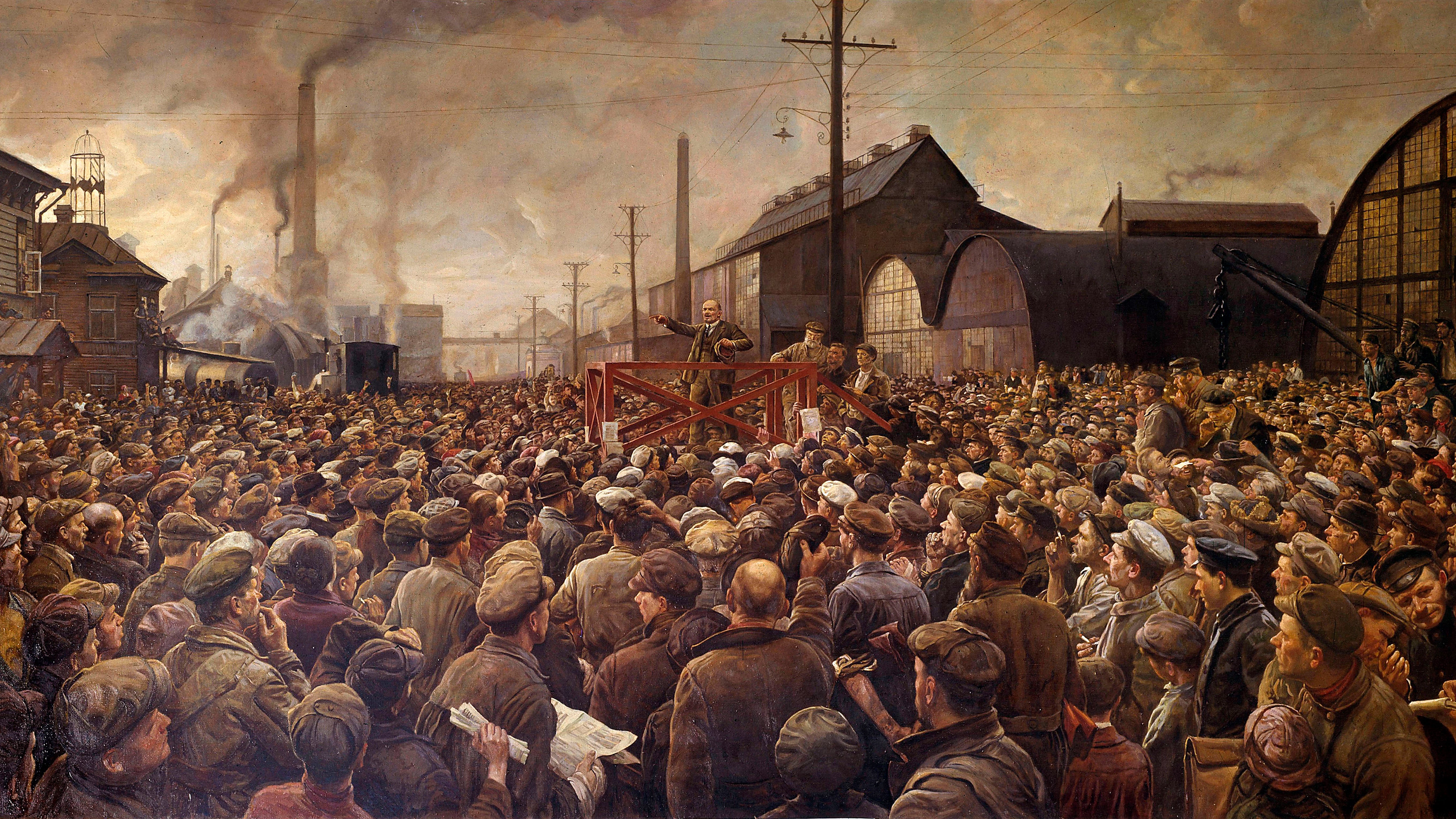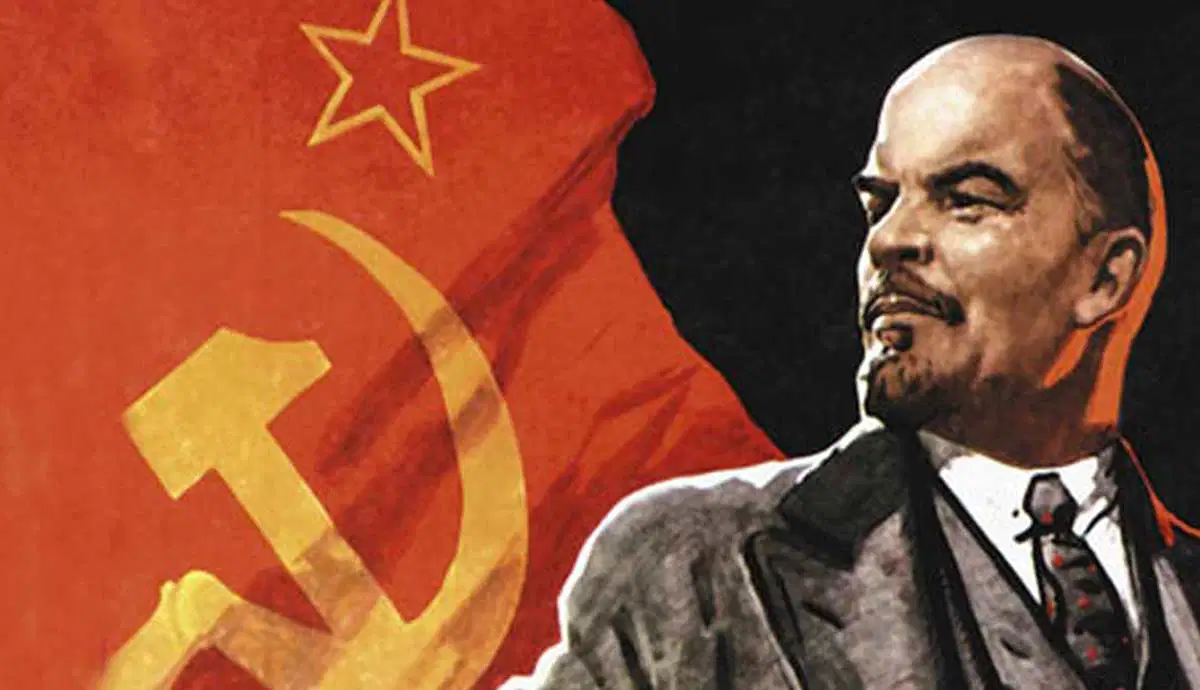Photo AI
Last Updated Sep 26, 2025
Dictatorship, Democracy and Lenin in Power Simplified Revision Notes for Leaving Cert History
Revision notes with simplified explanations to understand Dictatorship, Democracy and Lenin in Power quickly and effectively.
469+ students studying
Dictatorship, Democracy and Lenin in Power
This selection of notes is the first of many on the Dictatorship and Democracy Unit. Specifically, it will deal with life in Russia from 1917-38, culminating with Stalin's Show Trials, a key DBQ topic for 6th years sitting their LC exam in June 2025. This first piece will deal with these topics:
- What is Dictatorship and Democracy?
- The Early Rule of Lenin and an introduction to his policies
- The October Revolution
Dictatorship
- Dictatorship is a form of government in which a single person or a small group holds absolute power without effective constitutional limitations. In dictatorships, leaders often come to power through force or manipulation and maintain control through intimidation, propaganda, and restriction of freedoms. Political opposition is typically suppressed, and civil liberties are limited.
- Historical examples include Adolf Hitler in Germany and Joseph Stalin in the Soviet Union. The primary goal is to maintain control over all aspects of life within the country, often justifying it as necessary for national stability or security.
Democracy
- Democracy is a system of government where power is vested in the people, who rule either directly or through freely elected representatives. Key principles of democracy include the protection of human rights, the rule of law, and free and fair elections.
- Citizens have the right to participate in decision-making processes, express their opinions, and hold their leaders accountable.
- Examples of democratic nations include the United States, the United Kingdom, and India. Democracies emphasise individual freedoms, equality, and the importance of civil liberties.
A Snapshot of Lenin's Influence in Russia Pre-October Revolution
Early Life and Revolutionary Activities
- Vladimir Ilyich Ulyanov, known as Lenin, was born in 1870 in Simbirsk, Russia.
- His older brother, Alexander, was executed for plotting to assassinate Tsar Alexander III, which profoundly influenced Lenin's revolutionary path.
- Lenin studied law but became increasingly involved in radical politics, joining Marxist groups and reading the works of Karl Marx and Friedrich Engels.
Formation of the Bolshevik Party
- In 1895, Lenin helped form the Union of Struggle for the Emancipation of the Working Class in St. Petersburg, advocating for Marxist ideas.
- Arrested and exiled to Siberia, he continued to write and develop his theories.
- In 1903, at the Second Congress of the Russian Social Democratic Labour Party (RSDLP), a split occurred, leading to the formation of two factions: the Bolsheviks, led by Lenin, and the Mensheviks.
- The Bolsheviks advocated for a small, disciplined party of professional revolutionaries, while the Mensheviks favoured a broader, more inclusive party.
Role in the 1905 Revolution
- The failed 1905 Revolution was a precursor to the 1917 revolutions. Lenin believed it demonstrated the need for a vanguard party to lead the proletariat.
- During this period, he refined his theories on the role of the party and the necessity of a revolutionary overthrow of the existing government.
Exile and Ideological Development
- Between 1905 and 1917, Lenin spent much time in exile in Western Europe, continuing to write and argue for his version of Marxism.
- He published significant works like "What Is to Be Done?" (1902), advocating for a strong, centralised party, and "Imperialism, the Highest Stage of Capitalism" (1916), analysing the global dynamics of capitalism and predicting its inevitable collapse.
Return to Russia and April Theses
- The February Revolution of 1917 led to the abdication of Tsar Nicholas II and the establishment of the Provisional Government.
- Lenin, then in Switzerland, saw an opportunity. With the help of the Germans, who hoped his return would further destabilise Russia, Lenin travelled back to Petrograd in April 1917.
- Upon arrival, he issued the April Theses, calling for "Peace, Land, and Bread" and "All power to the Soviets." These radical demands sought immediate withdrawal from World War I, land redistribution to the peasants, and power transfer from the Provisional Government to the Soviets (workers' councils).
Preparation for Revolution
- Throughout 1917, Lenin worked tirelessly to build support for the Bolsheviks among workers, soldiers, and peasants.
- He emphasised the failures of the Provisional Government, particularly its inability to end the war and address land reforms.
- Lenin's leadership and persuasive rhetoric were crucial in rallying the masses and preparing the ground for the October Revolution.
Key Quotes on Lenin's Rise to Power
"Without a revolutionary theory, there can be no revolutionary movement." - Lenin
"Peace, Land, and Bread!" - Lenin's slogan from the April Theses
"All power to the Soviets!" - Lenin
Let's take a look at some key notes on the October Revolution and Lenin's Role within it. This will provide some valuable context if you decide to write an essay on Leni as an effective or ineffective leader.
The October Revolution
Background and Build-Up
- By October 1917, Russia was in a state of chaos. The Provisional Government, established after the February Revolution, was failing to address key issues such as the continuation of World War I, widespread hunger, and peasant land demands.
- Discontent was rampant among workers, soldiers, and peasants. The Bolsheviks, led by Lenin, had been gaining support by promising "Peace, Land, and Bread" and advocating for the Soviets to take power.
Planning the Revolution
- Vladimir Lenin played a crucial role in planning the October Revolution. Returning to Petrograd in April 1917, he galvanised the Bolsheviks with his April Theses, calling for the overthrow of the Provisional Government.
- By October, Lenin believed the time was ripe for an armed insurrection. He convinced the Bolshevik Central Committee to support an immediate revolution despite resistance from some members who feared the timing was premature.

Execution of the Revolution
- The revolution began on October 25, 1917 (Julian calendar), with the Military Revolutionary Committee (MRC) of the Petrograd Soviet, dominated by Bolsheviks, playing a pivotal role in organising the uprising.
- Bolshevik forces, including the Red Guards (armed workers) and sympathetic soldiers and sailors, began seizing key locations in Petrograd. This included bridges, post offices, and railway stations.
- The key moment came when the revolutionaries stormed the Winter Palace, the seat of the Provisional Government. A small contingent of cadets, Cossacks, and the Women's Battalion defended the palace, but resistance was minimal.
Lenin's Leadership
- Lenin was not physically present at the storming of the Winter Palace but directed operations from the Smolny Institute, the Bolshevik headquarters.
- His strategic insight was crucial in ensuring the revolution's success. He advocated for swift, decisive action, and his relentless energy and persuasive skills kept the Bolsheviks focused on their goals.

- Lenin's insistence on the immediate transfer of power to the Soviets ensured that the revolution did not stall, avoiding the pitfalls that could have arisen from a prolonged struggle.
Aftermath and Impact
- By the morning of October 26, the Provisional Government had been overthrown. Key ministers were arrested, and the Bolsheviks declared the establishment of Soviet power.
- The Second All-Russian Congress of Soviets convened, and Lenin announced the new Bolshevik government, called the Council of People's Commissars, with himself as the head.
- In the immediate aftermath, the Bolsheviks consolidated their power. They nationalised land, withdrew Russia from World War I through the Treaty of Brest-Litovsk, and initiated widespread reforms in alignment with communist ideology.
Key Quotes on the Revolution
"History will not forgive us if we do not assume power now." - Lenin
"We shall now proceed to construct the socialist order." - Lenin
"The Provisional Government has been deposed." - Bolshevik announcement after storming the Winter Palace
500K+ Students Use These Powerful Tools to Master Dictatorship, Democracy and Lenin in Power For their Leaving Cert Exams.
Enhance your understanding with flashcards, quizzes, and exams—designed to help you grasp key concepts, reinforce learning, and master any topic with confidence!
324 flashcards
Flashcards on Dictatorship, Democracy and Lenin in Power
Revise key concepts with interactive flashcards.
Try History Flashcards41 quizzes
Quizzes on Dictatorship, Democracy and Lenin in Power
Test your knowledge with fun and engaging quizzes.
Try History Quizzes29 questions
Exam questions on Dictatorship, Democracy and Lenin in Power
Boost your confidence with real exam questions.
Try History Questions27 exams created
Exam Builder on Dictatorship, Democracy and Lenin in Power
Create custom exams across topics for better practice!
Try History exam builder117 papers
Past Papers on Dictatorship, Democracy and Lenin in Power
Practice past papers to reinforce exam experience.
Try History Past PapersOther Revision Notes related to Dictatorship, Democracy and Lenin in Power you should explore
Discover More Revision Notes Related to Dictatorship, Democracy and Lenin in Power to Deepen Your Understanding and Improve Your Mastery
96%
114 rated
Communism in Russia
The First Communist Government and Lenin's Policies
299+ studying
196KViews96%
114 rated
Communism in Russia
Lenin and the New Economic Policy & Kronstadt Rising
379+ studying
195KViews